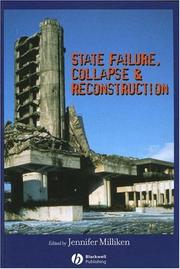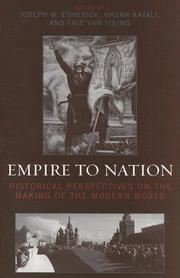| Listing 1 - 5 of 5 |
Sort by
|

ISBN: 1405105364 9781405105361 Year: 2003 Publisher: Malden (Mass.) : Blackwell,
Abstract | Keywords | Export | Availability | Bookmark
 Loading...
Loading...Choose an application
- Reference Manager
- EndNote
- RefWorks (Direct export to RefWorks)
Politics --- State, The --- Political culture --- History --- Etat --- Culture politique --- Histoire --- State, The - History - 20th century - Case studies --- Political culture - History - 20th century - Case studies

ISBN: 0742540308 0742540316 9780742540316 9780742540309 0742578151 9780742578159 Year: 2006 Publisher: Lanham, Maryland ; Oxford, England : Rowman & Littlefield Publishers, Inc.,
Abstract | Keywords | Export | Availability | Bookmark
 Loading...
Loading...Choose an application
- Reference Manager
- EndNote
- RefWorks (Direct export to RefWorks)
The fall of empires and the rise of nation-states was a defining political transition in the making of the modern world. Here, ten prominent specialists discuss the empire-to-nation transition in comparative perspective. Chapters on Latin America, the Middle East, Eastern Europe, Russia, and China illustrate both the common features and the diversity of the transition. While previous studies have focused on the rise and fall of empires or on nationalism and the process of nation-building, this intriguing volume concentrates on the empire-to-nation transition itself.
World politics --- State, The --- History --- S02/0200 --- S04/0400 --- S04/0680 --- S24/0900 --- China: General works--Civilization and culture --- China: History--General works: China --- China: History--Qing: general: 1644 - 1912 --- Tibet--Religion and philosophy --- Administration --- Commonwealth, The --- Sovereignty --- Political science --- World politics - 19th century --- World politics - 20th century --- State, The - History - 19th century --- State, The - History - 20th century
Book
ISSN: 04795997 ISBN: 9783486576719 3486576712 3486836722 Year: 2006 Volume: 72 Publisher: München : Oldenbourg,
Abstract | Keywords | Export | Availability | Bookmark
 Loading...
Loading...Choose an application
- Reference Manager
- EndNote
- RefWorks (Direct export to RefWorks)
Der Staat ist ein zentraler geschichts- und sozialwissenschaftlicher Topos in Deutschland wie in Frankreich. In der vergleichenden Forschung zu beiden Ländern taucht er hingegen so gut wie nicht auf. Der vorliegende Band zielt auf diese Lücke. Er vereint aktuelle Forschungen zur Geschichte des Staates in Deutschland und Frankreich von 1870 bis 1945, zu jener Phase, in der nicht nur der Staat als regulierender Faktor der Gesellschaft, sondern auch die Wissenschaft vom Staat ihre größte Entfaltung in der Moderne erfuhren. Neben vergleichenden stehen einander "kreuzende" Beiträge, die Texte deutscher Autoren über Frankreich und französischer Autoren über Deutschland enthalten.
State, The --- History --- France --- Germany --- Politics and government --- Administration --- Commonwealth, The --- Sovereignty --- Political science --- Third Reich, 1933-1945 --- State, The - History - 19th century --- State, The - History - 20th century --- Allemagne --- France - Politics and government - 1870-1940 --- France - Politics and government - 1940-1945 --- Germany - Politics and government - 1871-1933 --- Germany - Politics and government - 1933-1945
Book
ISBN: 3495476393 9783495476390 Year: 1988 Volume: 26 Publisher: Freiburg: Alber,
Abstract | Keywords | Export | Availability | Bookmark
 Loading...
Loading...Choose an application
- Reference Manager
- EndNote
- RefWorks (Direct export to RefWorks)
Jurisprudence --- Political science --- Law --- State, The --- History --- Philosophy --- Schmitt, Carl --- -Jurisprudence --- -Political science --- -Law --- -Acts, Legislative --- Enactments, Legislative --- Laws (Statutes) --- Legislative acts --- Legislative enactments --- Legislation --- Administration --- Civil government --- Commonwealth, The --- Government --- Political theory --- Political thought --- Politics --- Science, Political --- Social sciences --- Sovereignty --- -History --- -Philosophy --- Schmitt, Carl M. --- -Schmitt, Carl --- Acts, Legislative --- Schmitt, Carl, --- Schmitt-Dorotić, Carl, --- Dorotić, Carl Schmitt-, --- Shumitto, Kāru, --- Shmitt, Karl, --- שמיט, קרל, --- Šmit, Karl, --- Jurisprudence - History - 20th century --- Political science - History - 20th century --- Law - Philosophy - History - 20th century --- State, The - History - 20th century
Book
ISBN: 9780521760881 0521760887 9781139009072 9780511974144 9781107618046 9781139010122 1139010123 1139012401 1107216575 128301727X 9786613017277 1139009591 1139009079 1139007971 113900686X 0511974140 1107618045 Year: 2011 Publisher: Cambridge : Cambridge University Press,
Abstract | Keywords | Export | Availability | Bookmark
 Loading...
Loading...Choose an application
- Reference Manager
- EndNote
- RefWorks (Direct export to RefWorks)
This book argues that Putin's strategy for rebuilding the state was fundamentally flawed. Taylor demonstrates that a disregard for the way state officials behave toward citizens - state quality - had a negative impact on what the state could do - state capacity. Focusing on those organizations that control state coercion, what Russians call the 'power ministries', Taylor shows that many of the weaknesses of the Russian state that existed under Boris Yeltsin persisted under Putin. Drawing on extensive field research and interviews, as well as a wide range of comparative data, the book reveals the practices and norms that guide the behavior of Russian power ministry officials (the so-called siloviki), especially law enforcement personnel. By examining siloviki behavior from the Kremlin down to the street level, State Building in Putin's Russia uncovers the who, where and how of Russian state building after communism.
Post-communism --- Power (Social sciences) --- Federal government --- Police power --- Duress (Law) --- State, The --- Postcommunisme --- Pouvoir (Sciences sociales) --- Fédéralisme --- Police --- Contrainte (Droit) --- Etat --- History --- History. --- Histoire --- Pouvoirs --- Putin, Vladimir Vladimirovich, --- Yeltsin, Boris Nikolayevich, --- Political and social views. --- Influence. --- Russia (Federation) --- Russie --- Politics and government --- Politique et gouvernement --- Political and social views --- Influence --- Administration --- Commonwealth, The --- Sovereignty --- Political science --- Coercion (Law) --- Compulsion --- Criminal liability --- Law --- Necessity (Law) --- Threats --- Torts --- Undue influence --- Administrative law --- Constitutional law --- Municipal corporations --- Right of property --- Division of powers --- Federal-provincial relations --- Federal-state relations --- Federal systems --- Federalism --- Central-local government relations --- Decentralization in government --- State governments --- Empowerment (Social sciences) --- Political power --- Exchange theory (Sociology) --- Social sciences --- Sociology --- Consensus (Social sciences) --- Postcommunism --- World politics --- Communism --- Law and legislation --- Elʹt︠s︡in, B. N. --- Elʹt︠s︡in, Boris Nikolaevich, --- Eltsine, Boris, --- Enxin, Bôrít, --- Jelzin, Boris, --- Ельцин, Борис Николаевич, --- ילצין, בוריס ניקולייביץ׳, --- Putin, Wladimir Wladimirowitsch, --- Putin, Volodymyr, --- Pujing, --- Poutine, Vladimir Vladimirovitch, --- Путин, Владимир Владимирович, --- Putinas, Vladimiras, --- Fédéralisme --- Powers, Division of --- Provincial-federal relations --- State-federal relations --- Putin, V. V. --- Jeltsin, Boris, --- Poetin, Vladimir Vladimirovitsj, --- Social Sciences --- Political Science --- Post-communism - Russia (Federation) - History --- Power (Social sciences) - Russia (Federation) - History --- Federal government - Russia (Federation) - History --- Police power - Russia (Federation) - History --- Duress (Law) - Russia (Federation) - History --- State, The - History - 20th century --- State, The - History - 21st century --- Putin, Vladimir Vladimirovich, - 1952- - Political and social views --- Yeltsin, Boris Nikolayevich, - 1931-2007 - Influence --- Russia (Federation) - Politics and government - 1991 --- -Post-communism --- Putin, Vladimir Vladimirovich, - 1952 --- -Yeltsin, Boris Nikolayevich, - 1931-2007
| Listing 1 - 5 of 5 |
Sort by
|

 Search
Search Feedback
Feedback About UniCat
About UniCat  Help
Help News
News